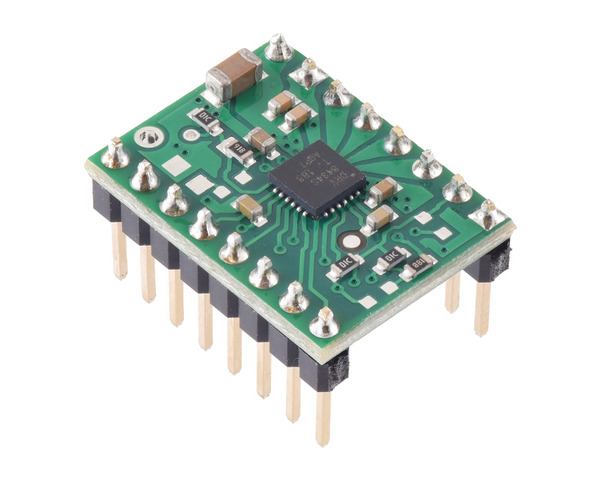

This is a merged information page for Item #3769.
View normal product page.
Pololu item #:
3769
Brand:
Pololu
Status:
Active and Preferred

This version of our DRV8434S SPI Stepper Motor Driver Carrier, 2A Max. Current Limit ships with male header pins installed, so no soldering is required to use it with an appropriate 16-pin socket or solderless breadboard. Please see the DRV8434S SPI Stepper Motor Driver Carrier, 2A Max. Current Limit product page for more information about the driver.
Alternatives available with variations in these parameter(s): current limit control header pins soldered? Select variant…
 Compare all products in DRV8434x Stepper Motor Driver Carriers or
Compare all products in DRV8434x Stepper Motor Driver Carriers or  16-pin Stepper Motor Drivers.
16-pin Stepper Motor Drivers.
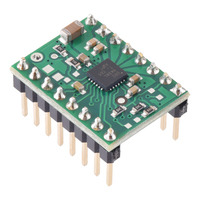 |
DRV8434S SPI Stepper Motor Driver Carrier, 2A Max. Current Limit (Header Pins Soldered). |
|---|
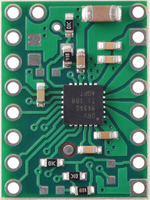 |
DRV8434S SPI Stepper Motor Driver Carrier, 2A Max. Current Limit (top view). |
|---|
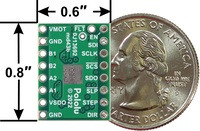 |
DRV8434S SPI Stepper Motor Driver Carrier, 2A Max. Current Limit, bottom view with dimensions. |
|---|
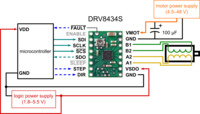 |
Typical wiring diagram for connecting a microcontroller to a DRV8434S stepper motor driver carrier. |
|---|
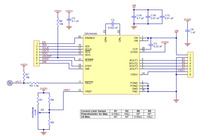 |
Schematic diagram of the DRV8434S SPI Stepper Motor Driver Carrier. |
|---|
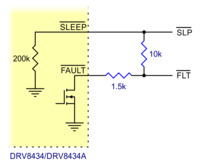 |
Schematic of nSLEEP and nFAULT pins on DRV8434/DRV8434A carriers. |
|---|
This version of our DRV8434S SPI Stepper Motor Driver Carrier, 2A Max. Current Limit ships with male header pins installed as shown in the main product picture, so no soldering is required to use it with an appropriate 16-pin socket or solderless breadboard. Please see the DRV8434S SPI Stepper Motor Driver Carrier, 2A Max. Current Limit product page for more information about the driver.
| Size: | 0.6″ × 0.8″ |
|---|---|
| Weight: | 2.4 g |
| Minimum operating voltage: | 4.5 V1 |
|---|---|
| Maximum operating voltage: | 48 V2 |
| Continuous current per phase: | 1.2 A3 |
| Maximum current per phase: | 2 A4 |
| Minimum logic voltage: | 1.8 V5 |
| Maximum logic voltage: | 5.5 V6 |
| Microstep resolutions: | full with 100% current, full with 70% current, non-circular 1/2, 1/2, 1/4, 1/8, 1/16, 1/32, 1/64, 1/128, 1/256 |
| Current limit control: | fixed 2A max with SPI scaling |
| Reverse voltage protection?: | N |
| Header pins soldered?: | Y |
| PCB dev codes: | md43b |
|---|---|
| Other PCB markings: | 0J13692 |
These DXF drawings show the locations of all of the holes on the DRV8434x Stepper Motor Driver Carriers.
This file contains 3D models (in the step file format) of the DRV8434x Stepper Motor Driver Carriers.
Texas Instruments product page for the DRV8434S, where you can find the latest datasheet and additional resources.
This is a library for Arduino that helps interface with a DRV8434S stepper motor driver. It uses the Arduino SPI library to communicate with the SPI interface (nSCS, SCLK, SDI, and SDO) of the DRV8434S.
Yes. To avoid damaging your stepper motor, you want to avoid exceeding the rated current, which is 600 mA in this instance. All of our stepper motor drivers let you limit the maximum current, so as long as you set the limit below the rated current, you will be within spec for your motor, even if the voltage exceeds the rated voltage. The voltage rating is just the voltage at which each coil draws the rated current, so the coils of your stepper motor will draw 600 mA at 3.9 V. By using a higher voltage along with active current limiting, the current is able to ramp up faster, which lets you achieve higher step rates than you could using the rated voltage.
If you do want to use a lower motor supply voltage for other reasons, consider using our DRV8834 or STSPIN-220 low-voltage stepper motor drivers.
Yes, you do! Setting the current limit on your stepper motor driver carrier is essential to making sure that it runs properly. An appropriate current limit also ensures that your motor is not allowed to draw more current than it or your driver can handle, since that is likely to damage one or both of them.
For the DRV8434A Stepper Motor Driver Carrier the current limit is set by adjusting the board’s potentiometer. We strongly recommend using a multimeter to measure the VREF voltage while setting the current limit so you can be sure you set it to an appropriate value (just turning the pot randomly until things seem to work is not a good approach). The following video has more details on setting the current limit:
Setting the current limit on the DRV8434S SPI Stepper Motor Driver Carrier, 2A Max. Current Limit is done through its SPI interface (this is very different from most of our other stepper motor driver carriers, which have their current limits set through their on-board potentiometers). The DRV8434S SPI Stepper Motor Driver Carrier, 2A Max defaults to its maximum possible current limit setting on start-up, which is much more current than the board can safely deliver, so you will need to set the current limit to an appropriate value for your stepper motor before enabling the driver outputs to prevent damage to the board. This is done by adjusting the TRQ_DAC bits in the CTRL1 register. The DRV8434S datasheet has more information on how to set the current limit through the SPI interface, and our Arduino library includes example sketches showing how to implement this in software.
For the DRV8434S SPI Stepper Motor Driver Carrier, Potentiometer for Max Current Limit, the current limit can be adjusted through both the onboard potentiometer and SPI. If the TRQ_DAC scaling factor at its left at its default of 100%, the potentiometer can be used alone to set the current limit, like with the DRV8434A. Otherwise, the TRQ_DAC value set through SPI is used to further scale the current limit set with the potentiometer.
Our selection of compact stepper motor driver carriers is expanding with the addition of three new boards based on the DRV8434A and DRV8434S from...